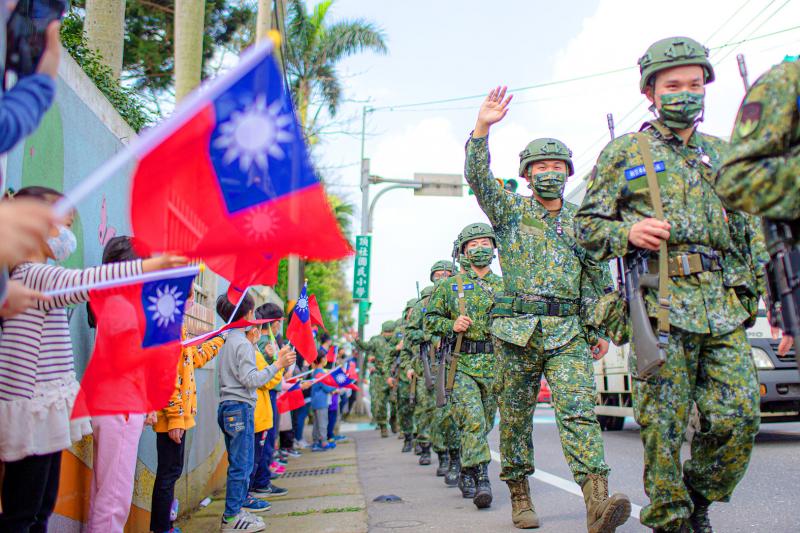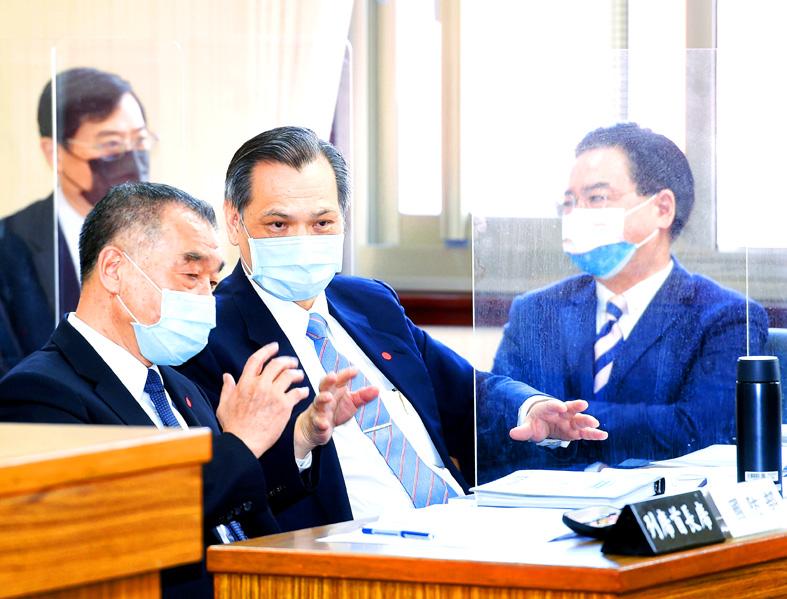War in the Taiwan Strait would only result in a “miserable victory” because of the high cost to the winner, Minister of National Defense Chiu Kuo-cheng (邱國正) told the legislature yesterday, while vowing that Taiwan would do everything in its power to avoid military conflict.
There are similarities between the situation in Ukraine, which has been invaded by Russia, and that of Taiwan, but there are also significant differences, he said.
“We have a geographic advantage, as the Taiwan Strait is a maritime barrier that is risky to cross,” he told the Foreign Affairs and National Defense Committee.

Photo: CNA
“No one wants war. It would take much preparation and assessment to engage in war, so China should really think it through beforehand. When fighting gets started, it would be severe for everyone. From ancient wars to recent ones, there are winning sides that only result in a miserable victory because of the heavy toll,” he added.
Chiu said that his ministry’s policy is to avoid war, but to remain vigilant and be prepared for any contingencies in case conflict breaks out.
Minister of Foreign Affairs Joseph Wu (吳釗燮) said that China would be making a mistake if it chooses military aggression against Taiwan.

Photo: Fang Pin-chao, Taipei Times
“China will pay a very heavy price,” Wu told the lawmakers.
“Because of the war in Ukraine, the world’s attention has been drawn to the security situation in the Taiwan Strait,” he said. “We are certain that China is aware of this, and it is seeing the worldwide response — that the global democratic alliance will not tolerate a country taking up arms to invade another country and undermine its sovereignty.”
National Security Bureau Director-General Chen Ming-tong (陳明通) said that China, taking advantage of the conflict in Ukraine, has heightened its political and economic pressure on Taiwan.
“This includes military threats, with China continuing its united front tactics and cognitive warfare to spread disinformation and penetrate our society. China is also engaging in cyberwarfare, stepping up hacker attacks and other tactics to intimidate us,” Chen said.
“In undertaking coordinated cyberwarfare and attacks on our Web sites, China’s purpose is to erode our national defense and digital security resources, to sow discord and internal conflict among our military and society, and to erode the public’s will to fight and defend our country,” he added.
“Our bureau is closely monitoring such Chinese campaigns in Taiwan and closely watching for any sign of hostile moves by the Chinese military,” he said.
Separately, military experts deliberated at a seminar organized by the Democratic Progressive Party on developments in Ukraine and how they affect Taiwan.
Experts agreed that the best way to deter Chinese aggression is for Taiwanese to defend their homeland.
If war breaks out, defense would be led by the armed forces, bolstered by military reservist troops, along with civilian defense networks, they said.
Asked if other nations would come to Taiwan’s aid in the event of war, Institute for National Defense and Security Research senior analyst Su Tzu-yun (蘇紫雲) said: “Taiwan must send a clear message to the world that we are implementing a comprehensive national defense system and will rely on ourselves, that Taiwan is not a free rider on the international community ... that our people will fight to defend Taiwan.”
Su said that fighting in Ukraine is a land war, but it would be different in Taiwan, which is surrounded by sea, posing more difficulties for China.
Taiwan also occupies a highly strategic position in the Indo-Pacific region, he added.
“Other countries will assist Taiwan in time of war, because the sea lanes around us are vital to the international community. To keep the global economy going, these lanes must be secured, given Taiwan’s pivotal role in the global supply chain, and to ensure that cargo ships and oil tankers can pass through between the Southeast Asian regions, and for Japan, South Korea and the US,” he said.

SECURITY: As China is ‘reshaping’ Hong Kong’s population, Taiwan must raise the eligibility threshold for applications from Hong Kongers, Chiu Chui-cheng said When Hong Kong and Macau citizens apply for residency in Taiwan, it would be under a new category that includes a “national security observation period,” Mainland Affairs Council (MAC) Minister Chiu Chui-cheng (邱垂正) said yesterday. President William Lai (賴清德) on March 13 announced 17 strategies to counter China’s aggression toward Taiwan, including incorporating national security considerations into the review process for residency applications from Hong Kong and Macau citizens. The situation in Hong Kong is constantly changing, Chiu said to media yesterday on the sidelines of the Taipei Technology Run hosted by the Taipei Neihu Technology Park Development Association. With

CARROT AND STICK: While unrelenting in its military threats, China attracted nearly 40,000 Taiwanese to over 400 business events last year Nearly 40,000 Taiwanese last year joined industry events in China, such as conferences and trade fairs, supported by the Chinese government, a study showed yesterday, as Beijing ramps up a charm offensive toward Taipei alongside military pressure. China has long taken a carrot-and-stick approach to Taiwan, threatening it with the prospect of military action while reaching out to those it believes are amenable to Beijing’s point of view. Taiwanese security officials are wary of what they see as Beijing’s influence campaigns to sway public opinion after Taipei and Beijing gradually resumed travel links halted by the COVID-19 pandemic, but the scale of

A US Marine Corps regiment equipped with Naval Strike Missiles (NSM) is set to participate in the upcoming Balikatan 25 exercise in the Luzon Strait, marking the system’s first-ever deployment in the Philippines. US and Philippine officials have separately confirmed that the Navy Marine Expeditionary Ship Interdiction System (NMESIS) — the mobile launch platform for the Naval Strike Missile — would take part in the joint exercise. The missiles are being deployed to “a strategic first island chain chokepoint” in the waters between Taiwan proper and the Philippines, US-based Naval News reported. “The Luzon Strait and Bashi Channel represent a critical access

Pope Francis is be laid to rest on Saturday after lying in state for three days in St Peter’s Basilica, where the faithful are expected to flock to pay their respects to history’s first Latin American pontiff. The cardinals met yesterday in the Vatican’s synod hall to chart the next steps before a conclave begins to choose Francis’ successor, as condolences poured in from around the world. According to current norms, the conclave must begin between May 5 and 10. The cardinals set the funeral for Saturday at 10am in St Peter’s Square, to be celebrated by the dean of the College